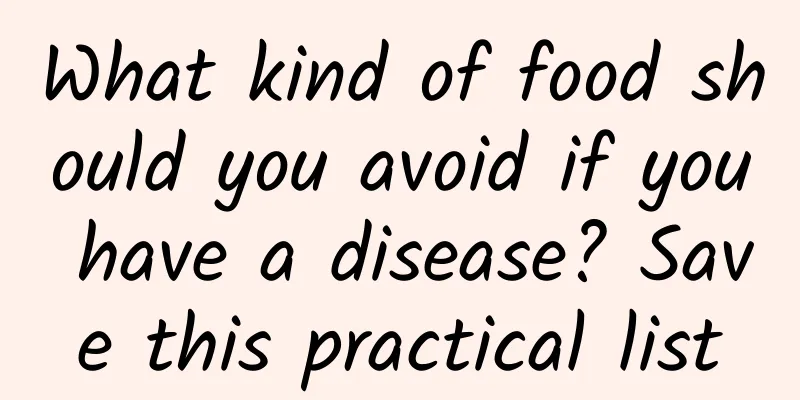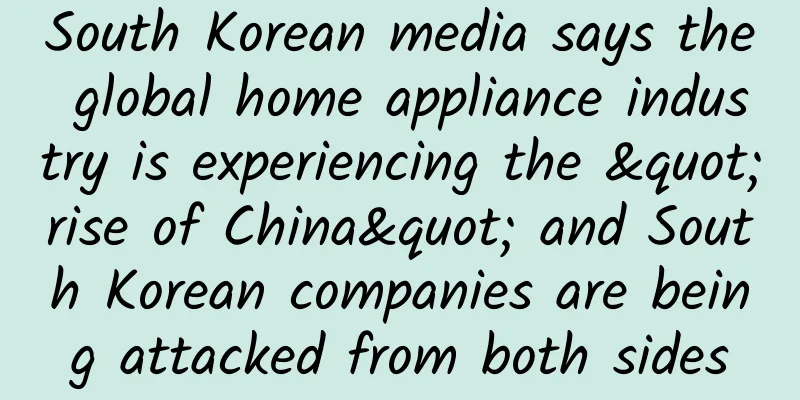What kind of food should you avoid if you have a disease? Save this practical list

|
Expert of this article: Pa Lize, Chief Physician of Nutrition, Science Popularization Committee Member of Chinese Nutrition Society Whenever I was sick, I would be told by my parents, relatives, friends, and other sources that I needed to avoid certain foods and drinks. Although some practices are not scientific, in fact, "avoiding certain foods" is to make the disease get better faster, and we should understand the taboos of common diseases. Copyright image, no permission to reprint If you do not pay attention to the corresponding dietary taboos when you have different diseases, it will not only be detrimental to recovery, but may even aggravate the condition. This article lists all the dietary taboos for hypertension, diabetes, and gout. Save it after reading it! What should patients with hypertension eat less? Most patients with hypertension do not have specific symptoms. A small number of people will experience headaches, swelling of the head, and stiff neck, which only occur after mental stress, anger, and strenuous physical activity. Most of them return to normal after rest. However, long-term high blood pressure may cause damage to the heart, brain, kidneys, and fundus organs and cause corresponding complications. Therefore, high blood pressure is also called the "silent killer"! Copyright image, no permission to reprint A proper diet can prevent, control and delay the occurrence of complications of hypertension. There is no specific type of food that is forbidden in a proper diet for hypertension, but it is strongly recommended to avoid high-sodium, high-fat foods and drinks that cause vasoconstriction and brain excitement. The foods that patients with hypertension need to strictly limit are as follows: High sodium foods Sodium is an indispensable macroelement in the human body. It plays important physiological roles in the human body, such as regulating body water and osmotic pressure; maintaining acid-base balance; participating in energy production and utilization; muscle movement; maintaining normal blood pressure and cardiovascular function. However, many studies have shown that a long-term high-sodium diet is a major risk factor for hypertension worldwide, with the evidence level being Class A. A high-sodium diet can also increase the risk of tumors such as gastric cancer. Common foods high in sodium include bacon, smoked meat, ham sausage, pickled vegetables, dried shrimp, dried shrimp, and kelp. Some condiments also have high sodium content, such as soy sauce, monosodium glutamate, oyster sauce, vinegar, and bean paste. If you have added these condiments to your cooking, you must reduce the amount of salt. What needs to be particularly vigilant is that many processed foods and drinks also contain invisible sodium salts, such as soda crackers, soda, beer, etc. Copyright image, no permission to reprint Foods high in fats, especially animal fats The fats and oils in food mainly come from plant oils and animal fats. They are triglycerides composed of glycerol and fatty acids. As one of the three major energy-supplying nutrients, fats and oils are closely related to human health. Studies have shown that a total fat energy ratio of no more than 30% helps maintain body weight. If the energy ratio drops below 24%, blood pressure can be lowered. Under the premise of controlling the total energy ratio, increasing the intake of olive oil can lower blood pressure. Therefore, patients with hypertension should eat less oil, eat good oil, avoid or eat less animal oil and fatty meat, and reduce the intake of saturated fat. The way food is cooked will change the fat content. Fried foods have a very high fat content. In daily life, you should choose more processing methods such as steaming, braising, stewing, and baking. Alcohol, spicy foods, and processed foods The high potassium content and some phytochemicals in wine and other alcoholic beverages help maintain normal blood pressure and reduce inflammation, but drinking large amounts of alcohol can increase heart rate, constrict blood vessels, increase inflammation, and also promote the deposition of calcium salts, cholesterol, etc. in blood vessel walls, leading to increased blood pressure. Spicy foods and refined foods low in dietary fiber can easily lead to difficulty in defecation, which can cause a sudden rise in blood pressure when straining to defecate, and may also induce cerebral hemorrhage. Therefore, it is very important for patients with hypertension to avoid excessive intake of alcohol, spicy foods, and refined foods. What can’t people with diabetes eat? If people with diabetes can control the total calories and form the following habits, they can live as long as healthy people. # Ensure food diversity # Low fat, low salt, high dietary fiber # Eat small, frequent meals # Eat vegetables first, then meat, and finally staple food However, there are many misunderstandings about the dietary taboos for diabetes, and the wrong dietary taboos will not achieve the goal of making the patient's blood sugar and blood lipids reach or approach normal levels, maintain or reach ideal weight, and delay or reduce the occurrence of complications. Diabetic patients should pay attention to the following dietary taboos: Strictly limit added sugars and free sugars White sugar, brown sugar, rock sugar, sugar cubes, honey, all kinds of candies and sugary drinks are all added sugars, while the fructose and glucose in fruit juice and dried fruits are free sugars. Added sugars and free sugars are pure energy foods that contain almost no other nutrients. They are not suitable for consumption by diabetics. The intake of added sugars and free sugars should be strictly limited unless hypoglycemia occurs. Copyright image, no permission to reprint Reduce the consumption of foods that are easy to digest, absorb quickly, and quickly increase blood sugar after meals Rice porridge, white bread, steamed buns, soup noodles and almost all Chinese and Western pastries, as well as fruits such as lychees, longans, persimmons, sugarcane and dates, are fruits with a high glycemic index and can quickly increase blood sugar. Diabetic patients should try to reduce or avoid eating them. Reduce your intake of foods high in saturated fat and cholesterol Animal oils, animal offal, fat, chicken, duck, pig skin and other ingredients have high content of saturated fatty acids and cholesterol. It is recommended that diabetic patients eat less or not eat them. What can’t you eat if you have high uric acid? Hyperuricemia is a metabolic disease characterized by high blood uric acid due to decreased purine excretion and/or excessive endogenous purine production. If hyperuricemia is not controlled, uric acid deposits in the blood will form crystals, which may induce gout. In addition, hyperuricemia is also an independent risk factor for diabetes, dyslipidemia, chronic kidney disease and stroke. Copyright image, no permission to reprint Reducing the intake of exogenous purines in the diet, promoting and maintaining the body's proper nutritional status, can reduce the blood uric acid load, thereby reducing the risk of further development of gout and delaying the occurrence and development of related complications. In general, the dietary taboos for high uric acid are to reduce the intake of high-purine foods and foods that affect uric acid excretion. The details are as follows: Avoid high-purine foods Poultry meat, seafood, animal offal, spinach, mushrooms, asparagus and other foods have high purine content, so patients with high uric acid should avoid eating them. The purine content in food is as follows: offal > meat > fish > dried beans > nuts > leafy vegetables > cereals > fruits. Reduce fat intake Since patients with high uric acid are prone to secondary diseases such as hypertension and hyperlipidemia, they need to control their energy and fat energy supply ratio to be 10%-20% lower than that of normal people. Therefore, they should try to avoid foods with high fat content and adhere to the habit of cooking with less oil. Copyright image, no permission to reprint Do not overeat or eat large amounts of meat in one meal By discarding the soup after cooking seafood, meat and high-purine plant foods, you can reduce the amount of purine. Avoid a high-salt diet A long-term high-salt diet will increase the burden on the kidneys and affect the excretion of uric acid from the body, so patients should avoid eating foods with high salt content such as sausages, salted fish, and kimchi. Avoid alcohol and control fructose intake The metabolites of alcohol in the body will inhibit the excretion of uric acid, and excessive fructose intake will also reduce the excretion of uric acid from the kidneys. You should try to avoid drinking alcohol and fruit juice. The cover of this article and the pictures with watermarks in the text are from the copyright library and are not authorized for reproduction |
<<: Beware! If you see these bugs recently, don’t take photos!
Recommend
A complete set of Android asynchronous task classes
[[123542]] Today I would like to introduce a very...
E-commerce short video pyramid creation method (Part 1)
Many Douyin merchants always face the dilemma of ...
Is ibuprofen addictive? Are you taking ibuprofen correctly for menstrual cramps?
Author: Zhai Yan, Chief Physician, Department of ...
"Health from eating" series | What to do if you have a sore throat? Four things to do and two things to avoid when protecting your throat in autumn and winter
With the arrival of autumn and winter, the number...
Lao Wang: From 0 to 1, create a profitable headline account, with almost zero cost, but can earn millions of dollars a year
Lao Wang: From 0 to 1, create a profitable headli...
Audiobook "Return to the Ming Dynasty to Become a Prince" All 750 episodes of audio collection
By accident, Zheng Shaopeng, the ninth generation ...
Microsoft hints at further integration between Windows 11 and Android
In a new job listing, Microsoft has confirmed tha...
The third episode of the Aiti tribe consultation: Analysis of Python's advantages in big data processing
【51CTO.com original article】 Activity description...
I really like what Pulsar said: You don’t even want to call me a lighthouse.
Well-known Black holes are not holes, they are co...
Solve the three major pain points of information flow promotion in 5 steps! Collected~
In our promotion process, we often encounter thre...
After the iPhone price reduction across the board, how can I get a refund for the price difference if I bought it at a higher price?
On the evening of March 31, due to a sharp adjust...
Omdia: Progress of major 5G markets in the third quarter of 2022
During the quarter, operators made extensive use ...
The underlying logic of people, goods, and venues in the live broadcast room
In China, if there is money to be made in an indu...
Is your product suitable for influencer marketing?
Have you tried influencer marketing ? In 2017, in...
Apple ignores doubts and buys Beats: Don’t spoil my fun!
Buy, buy, buy!!! This phrase has been very popular...









